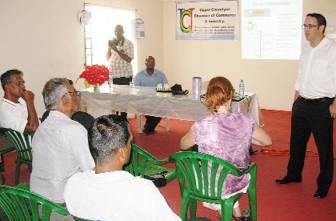At a lecture on “Democracy and the Role of Free, Fair and Transparent Elections in the Nation Building Process,” at Corriverton on Wednesday, a participant raised the issue of only one radio station operating in Guyana.
He also mentioned the state-owned television station, the National Communi-cations Network which “saturates the air with political propaganda” and questioned whether that was allowed in America.
The lecture was one in a series hosted by the US Embassy and conducted by guest speaker Dr. David Lublin, Professor, Department of Government, School of Public Affairs, American University.

It was organized by the Upper Corentyne Chamber of Commerce and Industry (UCCCI) and attended by members and other representatives.
Lublin responded that the government’s Voice of America station is “not allowed to broadcast in America because we are afraid of propagandizing our own people.”
He said too that the US government does not own or control the media and does not try to control how a reporter does a story.
The political scientist spoke about democracy and the components that are vital for its success. He also dealt with the electoral system and how they elect their government in the United States.
He pointed out that reporters provide coverage, which is often critical, of the major candidates. According to him, “reporters are very tough on politicians” who “feel more relaxed on talk shows.”
He said too that television and the media had to be open to the political parties and that the government does not have the power to censor the media. The first amendment to the constitution protects political speech, he said.
Lublin told the gathering that in America, government does not censor the media and that television stations had to take advertisements from both political parties.
According to him most newspapers try to separate news pages and the opinion pages. He said some newspapers are very biased towards one party or the other but mostly in the opinion pages.
While they tend to favour a particular party in the opinion pages they are very objective in the news pages. It is always their jobs to “dig into things and find out what is going on and ask tough questions.”
The participant mentioned too that “politicians from the ruling party go on public television and say it is multi-racial… but yet they have their foot soldiers going out in the communities… and tell residents not to split the votes.”
In response to a question about what role the Americans play in the elections in Guyana, political officer of the US Embassy, Michael Fraser said they work with the non-governmental organizations to promote a fair elections process.
Lublin said the US has a general interest in seeing democracy continue to flourish in Guyana but “ultimately the positive change is going to happen because it is demanded and being pushed for by Guyanese.”
He said too that “it is not appropriate for me… who has only been in the country for two days to tell them how to run it. You are Guyanese, it is your country and you should decide and you also know better…
it is not our job to tell you who to vote for…”
Another contributor was concerned that people are not being able to choose the local leaders because Local Government elections have not been held for 17 years.
Lublin said it was a complicated question but becomes a demand for Guyanese to change the system and have the elections regularly.
At the end of the lecture, President of the UCCCI, Vishnu Doerga told Stabroek News that it was very interesting to learn about the elections campaign in the US.
He was happy that “there was a lively gathering where persons were able to express their views and from the chamber perspective, that is very important. Our main focus is to get as much info as possible to the community.”




